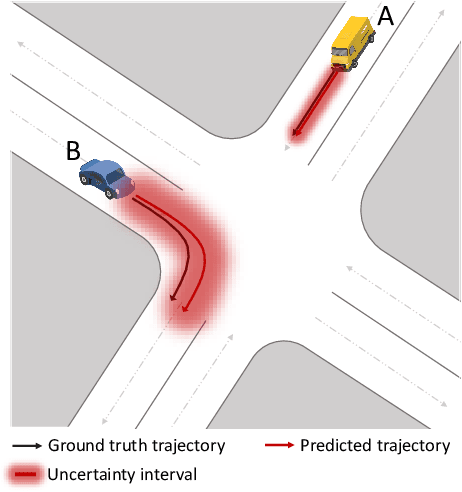Huiqun Huang
Uncertainty Quantification for Collaborative Object Detection Under Adversarial Attacks
Feb 04, 2025



Abstract:Collaborative Object Detection (COD) and collaborative perception can integrate data or features from various entities, and improve object detection accuracy compared with individual perception. However, adversarial attacks pose a potential threat to the deep learning COD models, and introduce high output uncertainty. With unknown attack models, it becomes even more challenging to improve COD resiliency and quantify the output uncertainty for highly dynamic perception scenes such as autonomous vehicles. In this study, we propose the Trusted Uncertainty Quantification in Collaborative Perception framework (TUQCP). TUQCP leverages both adversarial training and uncertainty quantification techniques to enhance the adversarial robustness of existing COD models. More specifically, TUQCP first adds perturbations to the shared information of randomly selected agents during object detection collaboration by adversarial training. TUQCP then alleviates the impacts of adversarial attacks by providing output uncertainty estimation through learning-based module and uncertainty calibration through conformal prediction. Our framework works for early and intermediate collaboration COD models and single-agent object detection models. We evaluate TUQCP on V2X-Sim, a comprehensive collaborative perception dataset for autonomous driving, and demonstrate a 80.41% improvement in object detection accuracy compared to the baselines under the same adversarial attacks. TUQCP demonstrates the importance of uncertainty quantification to COD under adversarial attacks.
Adaptive Uncertainty Quantification for Trajectory Prediction Under Distributional Shift
Jun 17, 2024



Abstract:Trajectory prediction models that can infer both finite future trajectories and their associated uncertainties of the target vehicles in an online setting (e.g., real-world application scenarios) is crucial for ensuring the safe and robust navigation and path planning of autonomous vehicle motion. However, the majority of existing trajectory prediction models have neither considered reducing the uncertainty as one objective during the training stage nor provided reliable uncertainty quantification during inference stage under potential distribution shift. Therefore, in this paper, we propose the Conformal Uncertainty Quantification under Distribution Shift framework, CUQDS, to quantify the uncertainty of the predicted trajectories of existing trajectory prediction models under potential data distribution shift, while considering improving the prediction accuracy of the models and reducing the estimated uncertainty during the training stage. Specifically, CUQDS includes 1) a learning-based Gaussian process regression module that models the output distribution of the base model (any existing trajectory prediction or time series forecasting neural networks) and reduces the estimated uncertainty by additional loss term, and 2) a statistical-based Conformal P control module to calibrate the estimated uncertainty from the Gaussian process regression module in an online setting under potential distribution shift between training and testing data.
 Add to Chrome
Add to Chrome Add to Firefox
Add to Firefox Add to Edge
Add to Edge